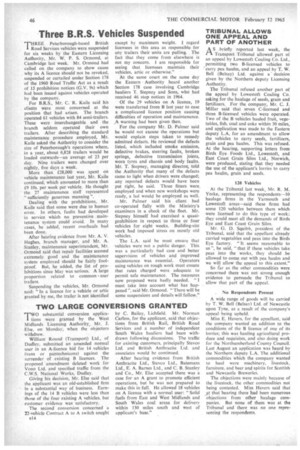Three B.R.S. Vehicles Suspended
Page 48

If you've noticed an error in this article please click here to report it so we can fix it.
THREE Peterborough-based British Road Services vehicles were suspended for six weeks by the Eastern Licensing Authority, Mr. W. P. S. Ormond, at Cambridge last week. Mr. Ormond had called on the company to show cause why its A licence should not be revoked, suspended or curtailed under Section 178 of the 1960 Road Traffic Act as a result of 15 prohibition notices (G.V. 9s) which had been issued against vehicles operated by the company.
For B.R.S., Mr. C. R. Kaile said his clients were most concerned at the position that had arisen. The branch operated 61 vehicles with 84 semi-trailers. These were interchangeable and the branch seldom operated their own trailers. After describing the standard maintenance procedure employed, Mr. Kaile asked the Authority to consider the size of Peterborough's operations where, in a year, about 6,828 trailers would be loaded outwards—an average of 23 per day. Nine trailers were changed over nightly, five days a week. More than £28,000 was spent on vehicle maintenance last year, Mr. Kaile continued, which amounted to more than £9 10s. per week per vehicle. He thought the 27 maintenance staff represented "sufficiently generous manning ". Dealing with the prohibitions, Mr. Kaile said that some were due to human error. In others, faults had developed in service which no preventive maintenance system could avoid. In many cases, he added, recent overhauls had been done.
After hearing evidence from Mr. A. V. Hughes, branch manager, and Mr. A. Stanley, maintenance superintendent, Mr. Ormond said that repair facilities seemed extremely good and the maintenance system employed should be fairly foolproof. But, he added, the list of prohibitions since May was serious. A large proportion related to common -user trailers.
Suspending the vehicles, Mr. Ormond said: "In a licence for a vehicle or artic granted by me, the trailer is not identified except by maximum weight, I regard licensees in this area as responsible for any trailers their units are pulling. The fact that they come from elsewhere is not my concern. I am responsible for seeing that licensees maintain their vehicles, artic or otherwise."
At the same court on the same day the Eastern Authority heard another Section 178 case involving Cambridge hauliers T. Stepney and Sons, who had received 46 stop notices in 1964.
Of the 29 vehicles on A licence, 19 were transferred from B last year to ease a complicated licence position causing difficulties of operation and maintenance. A warning had been given then.
For the company Mr. D. Palmer said he would not excuse the operations but would explain steps taken to remedy admitted defects. He reviewed the defects listed, which included smoke emission, defective brakes, steering faults, broken springs, defective transmission joints, worn tyres and chassis and body faults. Mr. T. Stepney, managing directon, told the Authority that many of the defects came to light when drivers were changed; any reported defects would have been put right, he said. Three fitters were. employed and when new workshops were ready, a lad would be employed as well.
Mr. Palmer said his client had co-operated fully with the Ministry's examiners in a check of the fleet. Mr. Stepney himself had exercised a quasiprohibition in respect to three or four vehicles for eight weeks. Building-site work had imposed stress on mostly old vehicles.
The L.A. said he must ensure that vehicles were• not a public danger. This was a particularly bad case and better supervision of vehicles and improved maintenance was essential. Operators using vehicles on rough work must ensure that rates charged were adequate to permit safe maintenance. The measures now proposed were badly needed. "I must take into account what has happened ", said Mr. Ormond. "There will be some suspensions and details will follow."






























































































































